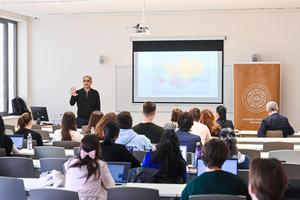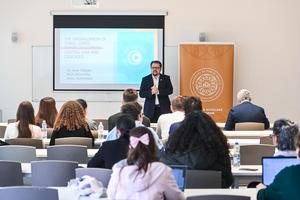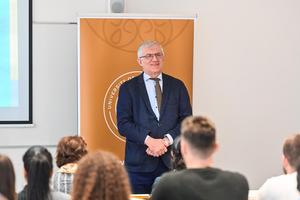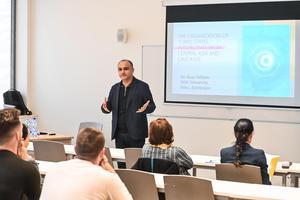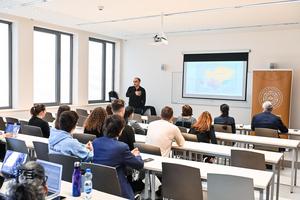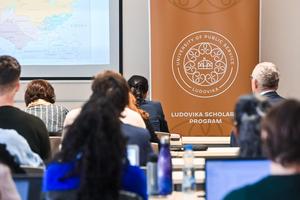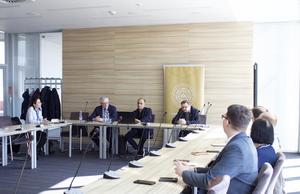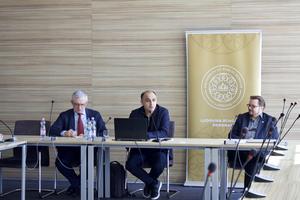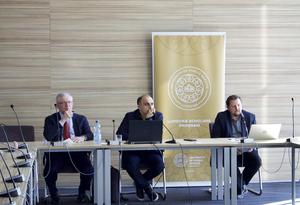Within the framework of the Ludovika Scholars Program, the Faculty of Public Governance and International Studies hosted Anar M. Valiyev, Professor at ADA University in Azerbaijan. During the one-week programme, he gave a public lecture on the background and objectives of the Organization of Turkic States and its interests in the new geopolitical environment. In a panel discussion, he outlined the current security challenges, the state of play of the Nagorno-Karabakh conflict and the growing strategic importance of the "Middle Corridor" for researchers and experts in the Caucasus region. In a special session for students of the Master's programme in International Studies, he introduced the methodology of policy brief writing and background analysis.
Anar Valiyev, former Fulbright Fellow at John Hopkins University, founding Dean of the School of Public and International Affairs at the ADA University, , currently Jean Monnet Chair and Rector’s delegate on research and grants at the University, not only presented the concentration of great power interests in the Caucasus region, but also pointed out the exceptional situation of Azerbaijan. The Organization of Turkic States, created by the Turkic-speaking countries of the region, acts as a kind of umbrella for its member states, able to lift them out of the shadow of Russian, Chinese and the powerful US geopolitical ambitions. The organisation can also provide security guarantees for the peaceful management of disputes in the region, the expansion of economic cooperation processes and unified negotiations with the European Union. In many of its elements, the organisation seeks to interpret the EU model for the region and to promote cooperation, he said. He stressed that it was a logical decision for Hungary to strengthen cooperation with the region, which is extremely rich in raw materials, through its Eastern Opening foreign policy, as Azerbaijan in particular looks to the Hungarian state with a kind of friendship from a distant relative and looks forward to the opportunity of economic development. This could become even more intense with the strategic revaluation of the 'Middle Corridor', as the infrastructure links between China and the European Union have been developed through this region since the start of Russian aggression against Ukraine.
In his presentation, Anar Valiyev detailed the importance of creating an infrastructure transit corridor (the so-called Zangezur Corridor), which would ensure the passage between the core area of Azerbaijan and the so-called Nakhichevan exclave of Azerbaijan without any extra administrative burden, while recognizing the integrity of the Armenian territories. However, this would currently be an unacceptable challenge for many countries in the region, including both Armenia and Iran.
In a series of questions related to the lecture, the students discussed with Professor Valiyev the situation of the more than 20 million ethnic Azeris living in Iran, the Azerbaijani attitude and possible scenarios towards the Armenian minority, the development of EU-Azeri relations and the role of Hungary in the Organisation of Turkic States.
Text: International Division, FPGIS, LUPS
Photos: Dénes Szilágyi, András Szabó
